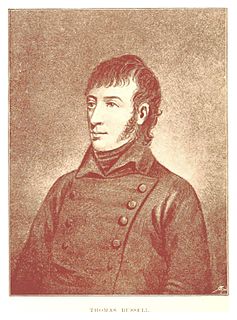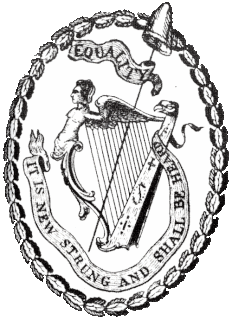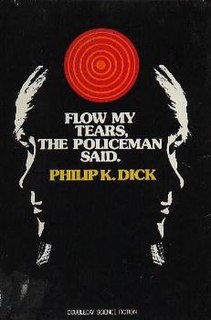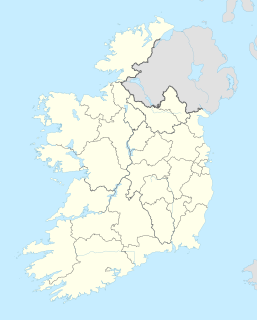The Man From God Knows Where is a 19th-Century Irish ballad composed by Florence Mary Wilson. [1] [2] [3]
Florence Mary Wilson was a poet who wrote the ballad The Man from God Knows Where.
Contents

The Man From God Knows Where is a 19th-Century Irish ballad composed by Florence Mary Wilson. [1] [2] [3]
Florence Mary Wilson was a poet who wrote the ballad The Man from God Knows Where.

The song tells the story of notable Irish rebel Thomas Russell, the founder of the United Irishmen. One night during the 1798 Rebellion, he entered a tavern in County Down where he was organizing the local rebels. The tavern's location is disputed, some suggesting Killyleagh or Loughinisland. The tavern contained United Irishmen volunteers however he did not know them, and they did not know him, or why he was there. One of the men tells the tale seeing Russell that night, and again meeting him under different circumstances. [4] The song also references local reverend Archibald Warwick's hanging.

Thomas Paliser Russell was a co-founder and leader of the United Irishmen. He was executed for his part in Robert Emmet's rebellion in 1803.

The Society of United Irishmen, founded as a Radical or liberal political organisation in 18th-century Ireland, initially sought Parliamentary reform. It evolved into a revolutionary republican organisation, inspired by the American Revolution and allied with Revolutionary France. It launched the Irish Rebellion of 1798 with the objective of ending British monarchical rule over Ireland and founding a sovereign, independent Irish republic.

The Irish Rebellion of 1798 was an uprising against British rule in Ireland from May to September 1798. The United Irishmen, a republican revolutionary group influenced by the ideas of the American and French revolutions, were the main organising force behind the rebellion. It was led by Presbyterians angry at being shut out of power by the Anglican establishment, joined by Catholics, who made up the majority of the population. Many Irish Ulster Protestants mainly Church of Ireland sided with the British, resulting in the conflict taking on the appearance of a sectarian civil war in many areas, with atrocities on both sides. A French army which landed in County Mayo in support of the rebels was overwhelmed by British and loyalist forces. The uprising was suppressed by British Crown forces with a death toll of between 10,000 and 30,000.

Flow My Tears, the Policeman Said is a 1974 science fiction novel by American writer Philip K. Dick. The story follows a genetically enhanced pop singer and television star who wakes up in a world where he has never existed. The novel is set in a futuristic dystopia, where the United States has become a police state in the aftermath of a Second Civil War. It was nominated for a Nebula Award in 1974 and a Hugo Award in 1975, and was awarded the John W. Campbell Memorial Award for Best Science Fiction Novel in 1975.

The Beautiful Game is a musical by Andrew Lloyd Webber and Ben Elton about a group of teenagers growing up during The Troubles in Belfast, Northern Ireland in 1969.

"Seven Drunken Nights" is a humorous Irish folk song most famously performed by The Dubliners. It is a variation of the Scottish folk song "Our Goodman". It tells the story of a gullible drunkard returning night after night to see new evidence of his wife's lover, only to be taken in by increasingly implausible explanations.

Henry Joy McCracken was an Irish Republican and industrialist from Belfast, Ireland. He was a founding member of the Society of the United Irishmen.

Dromahane is a village located 5 km (3.1 mi) south west of the town of Mallow, County Cork, Ireland on the R619 regional road.
William Drennan was an Irish physician, poet and political radical, who was one of the chief architects of the Society of United Irishmen. He is known as the first to refer in print to Ireland as "the emerald isle" in his poem "When Erin first rose".
James "Jemmy" Hope was a United Irishmen leader who fought in the 1798 and 1803 Rebellions against British rule in Ireland.

Michael Dwyer (1772–1825) was a United Irishmen leader in the 1798 rebellion. He later fought a guerrilla campaign against the British Army in the Wicklow Mountains from 1798–1803.
The Dunlavin Green executions refers to the summary execution of 36 suspected rebel prisoners in County Wicklow by the British military shortly after the outbreak of the rebellion of 1798. There are several accounts of the events, recorded at differing times and differing in detail.
Events from the year 1803 in Ireland.

The Battle of Ballynahinch was fought outside Ballynahinch, County Down, on 12 June, during the Irish rebellion of 1798 between British forces led by Major-General George Nugent and the local United Irishmen led by Henry Munro (1758–98).
The Irish rebellion of 1803 was an unsuccessful attempt by a group of Irish republicans and Irish nationalists to secure Ireland's independence from the United Kingdom.
Gilbert McIlveen was a Belfast linen draper and founding member of the Society of the United Irishmen, a revolutionary organisation in late 18th century Ireland.
Thomas McCabe was a founding member of the Society of the United Irishmen, a revolutionary organisation in late 18th century Ireland.
Michael Reynolds was the leader of the United Irish Kildare rebels during the Battle of Naas.
Samuel McTier was the first President of the Belfast Society of the United Irishmen, a revolutionary organisation in late 18th century Ireland.
James Dickey was an Ulster Presbyterian barrister and member of the Society of the United Irishmen, a revolutionary republican organisation in late 18th century Ireland.
William Tennant (1759–1832), often spelled William Tennent, was an Ulster Presbyterian banker and member of the Society of the United Irishmen, a revolutionary republican organisation in late 18th century Ireland.
Reverend Archibald Warwick was an Irish Presbyterian Republican minister who was hanged during the 1798 Irish rebellion.
| This folk song-related article is a stub. You can help Wikipedia by expanding it. |